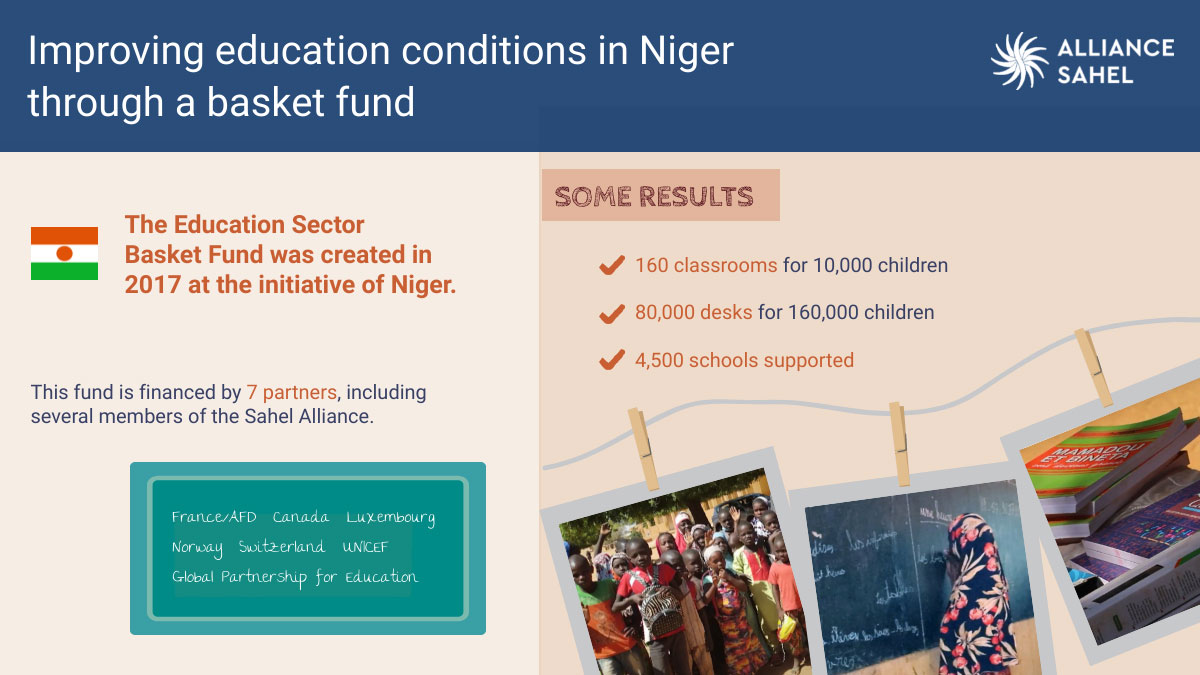In Niger, education as a unifying priority
Financed by 7 partners, the Education Sector Basket Fund (Fonds Commun Sectoriel de l’Education, FCSE) managed by Niger is a fine example of a collective effort between Alliance Sahel partners and Niger’s government. The signing of a financing agreement with Niger on 20 April 2022 marks the entry of Canada into the Fund, adding to the financing of AFD, Luxembourg, Switzerland, Norway, UNICEF and the Global Partnership for Education.

Under the leadership of President Mohamed Bazoum, the country has made education its priority for the coming years. Created in 2017 at the request of the Nigerien government, the FCSE pools funding from several partners. This funding is included in the Finance Act, in addition to the State budget, and is administered via the national public expenditure system using the staff of the Ministry of Finance.
The FCSE allows to:
- finance the entire education and training sector by supporting the implementation of the ministries’ annual plans.
- channel funds as close as possible to the beneficiaries, where the educational results are produced (funding of the 8 universities, management committees of the institutions).
- support the implementation of related reforms that are important for the country’s development: public finance and decentralisation.
80% of the funds are directed towards the devolved structures of the ministries, local authorities and learning institutions, in the regions, as close as possible to the actors on the ground who drive the transformations and produce educational results.
FCSE funding has already made it possible to:
- build 160 classrooms to accommodate approximately 10,000 children
- deliver 80,000 desks for 160,000 children to study
- provide grants to 4,500 schools
- increase the average number of textbooks in Form 1 from one for every six students to one for every two students (the accepted norm).
The fund is fully aligned with national procedures and brings together almost all stakeholders in Niger’s education sector. It is an instrument that is entirely adapted to the scale of the sector’s challenges, capable of supporting reforms specific to education but also critical projects such as decentralisation or public finance reforms in the country
Since 2017, 50 billion CFA francs (approximately 76 million euros) have been paid to the FCSE to support Niger’s education system and accompany reforms to reduce inequalities, raise the quality of teaching and learning, decentralise and improve public finance management.
Canada wishes to contribute to the implementation of Niger’s education policy by entrusting its funds to the French Development Agency (Agence Française de Développement, AFD) and by participating in the process of aligning external financing with the State’s procedures and programmes. Canada’s contribution (C$3 million over 3 years) is in addition to funding from AFD, Luxembourg, Switzerland, Norway, UNICEF and the Global Partnership for Education (whose funds are also delegated to AFD). It already strengthens the partnership dynamics of the FCSE and the Sahel Alliance in favour of greater coordination and renewed investments for the benefit of youth in the Sahel.
Go further

